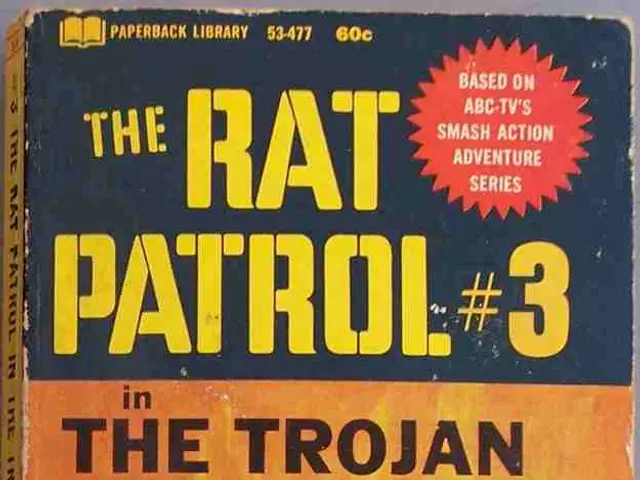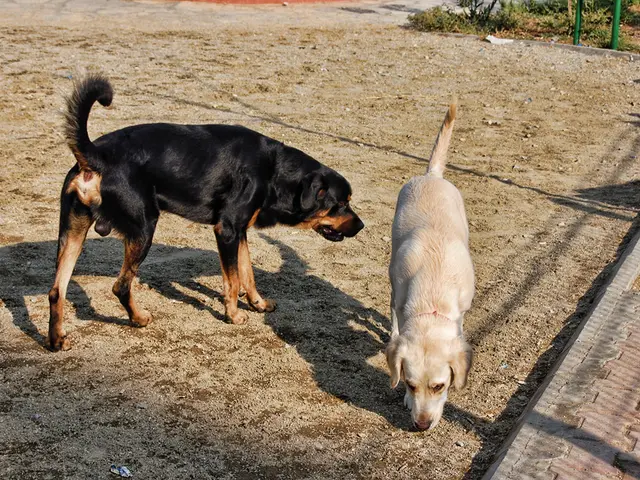Significant adjustments for city pet caretakers
In a stealthy move, Bangkok's pet ownership landscape is poised for a significant overhaul, with the new pet-related law set to take effect on January 10, 2024. Dubbed the BMA Ordinance on Animal Keeping and Release Control 2024, this legislation may drastically impact residents, particularly those with furry friends, as they navigate the city's crowded condos and busy streets.
Although the ordinance tackles a broad range of animals, it's the cat and dog owners who find themselves front and centre. The regulations aim to address the problem of stray animals and promote responsible pet ownership—but concerns are already brewing about public awareness and the legislation's practicality.
Thong Lor resident and project manager, Puchatr Guna-Tilaka, who looks after two cats and a local stray dog, expressed surprise upon hearing the news. He believes that the Bangkok Metropolitan Administration (BMA) needs to engage communities directly, rather than relying on published announcements.
"The BMA should hit the streets – markets, parks, and temples – to ensure everyone is kept in the loop," Puchatr stated. While he appreciated the ordinance's noble intentions, he worried about logistical hurdles, especially the requirement for mandatory microchipping, registration, and documenting pets.
"Given that these services might be free," Puchatr explained, "people may still resist complying if it proves too cumbersome." His suggestions for mobile clinics and public education drives could help boost compliance, in his view.
"The BMA will only make a real impact if they enforce these rules diligently and show leniency to begin with," Puchatr asserted, "Giving people time to understand and adapt is crucial."
The New Norm for Pet Owners
Under the new rules, Bangkok will be classified as a controlled zone comprising six categories of animals: mammals, poultry, aquatic creatures, amphibians, reptiles, and venomous or aggressive species. Nevertheless, it's pet owners who face the most immediate changes.
The ordinance requires pet owners to microchip and register their pets within 120 days of birth or 30 days after adoption. Owners will need to provide documents like their national ID, proof of residence, and rabies or sterilization certificates.
While walking their dogs, owners must keep them leashed, attach ID tags, and, for certain breeds like Pit Bulls and Rottweilers, utilize muzzles and be between the ages of 10-65. Failure to comply could result in financial penalties of up to 25,000 baht.
Living spaces also influence pet ownership limits, with small condos (20-80 sqm) allowed one pet and larger land plots capped at six. Existing pet owners who currently keep more than the specified number of pets will be permitted to keep them without interruption.
"The new law will not be retroactive when it takes effect in January," BMA deputy governor Tavida Kamolvej explained at a recent media briefing. For existing pet owners, she emphasized, "All that's needed is for them to register their pets and continue caring for them responsibly."
Lessons from the Past
Officials acknowledge past missteps, particularly an unsuccessful 2005 campaign aiming to distinguish pets from stray dogs. The BMA's Veterinary Services Division Director, Sittapol Emwisoot, emphasized the differences this time around – the ordinance now includes cats, which reproduce more rapidly than dogs. Unlike the previous effort, the law aims to create responsibility among pet owners, combat pet abandonment, and curb irresponsible pet ownership behaviors that can impact animal welfare.
The BMA also aims to control diseases transmitted by animals. "Our ultimate objective is to decrease animal abandonment and instill a sense of accountability in pet owners," Sittapol stated. As the number of cats has noticeably risen in Bangkok since the COVID-19 pandemic, the initiative will microchip both cats and dogs.
"Cats can become pregnant multiple times per year, while dogs typically have only two litters," Sittapol explained, "We're bringing in mobile units and partnering with veterinary organizations to ensure the broadest reach."
A Promising Leap, with Caveats
The Thai Animal Guardians Association secretary-general, Roger Lohnardt, applauded the legislation's ambition but raised concerns about loopholes, such as exemptions for government animals, unclear rules for businesses and shelters, and the lack of regulations concerning irresponsible breeding and unlicensed pet sales.
"We're addressing symptoms rather than causes without tackling these issues," Lohnardt cautioned.
Dayin Petcharat, founder of SOS Animal Thailand Foundation, echoed the concern but viewed the ordinance as a potential turning point for animal welfare in Thailand, "If implemented carefully and with compassion, this could mark a significant milestone for animal welfare in Thailand," Dayin stated.
Mobile microchipping teams and alignment with breeder licensing laws were proposed by Dayin to prevent unchecked reproduction in densely populated urban areas.
The success of the BMA Ordinance on Animal Keeping and Release Control 2024 in reining in pet ownership and promoting responsible behavior remains to be seen. As Bangkok's pet population eagerly awaits the arrival of the law, fellow residents can only hope that the BMA will navigate this transition with diligence, compassion, and the aim to truly improve the well-being of Bangkok’s furry citizens.
- Pet owners in Bangkok are required to abide by the BMA Ordinance on Animal Keeping and Release Control 2024, which classifies the city into six categories of animals and imposes new regulations on pet owners.
- Under the new ordinance, pet owners must microchip and register their pets within specified timeframes, provide necessary documentation, and adhere to various rules such as leashing dogs and muzzling certain breeds while walking them.
- Although the ordinance is aimed at promoting responsible pet ownership, concerns about public awareness, practicality, and potential financial penalties for non-compliance have been expressed by residents like Puchatr Guna-Tilaka.
- As Bangkok transitions into a controlled pet ownership landscape, it is crucial for the BMA to ensure effective communication with the community, provide mobile services for microchipping, and address loopholes in the legislation, as suggested by the Thai Animal Guardians Association and SOS Animal Thailand Foundation.







